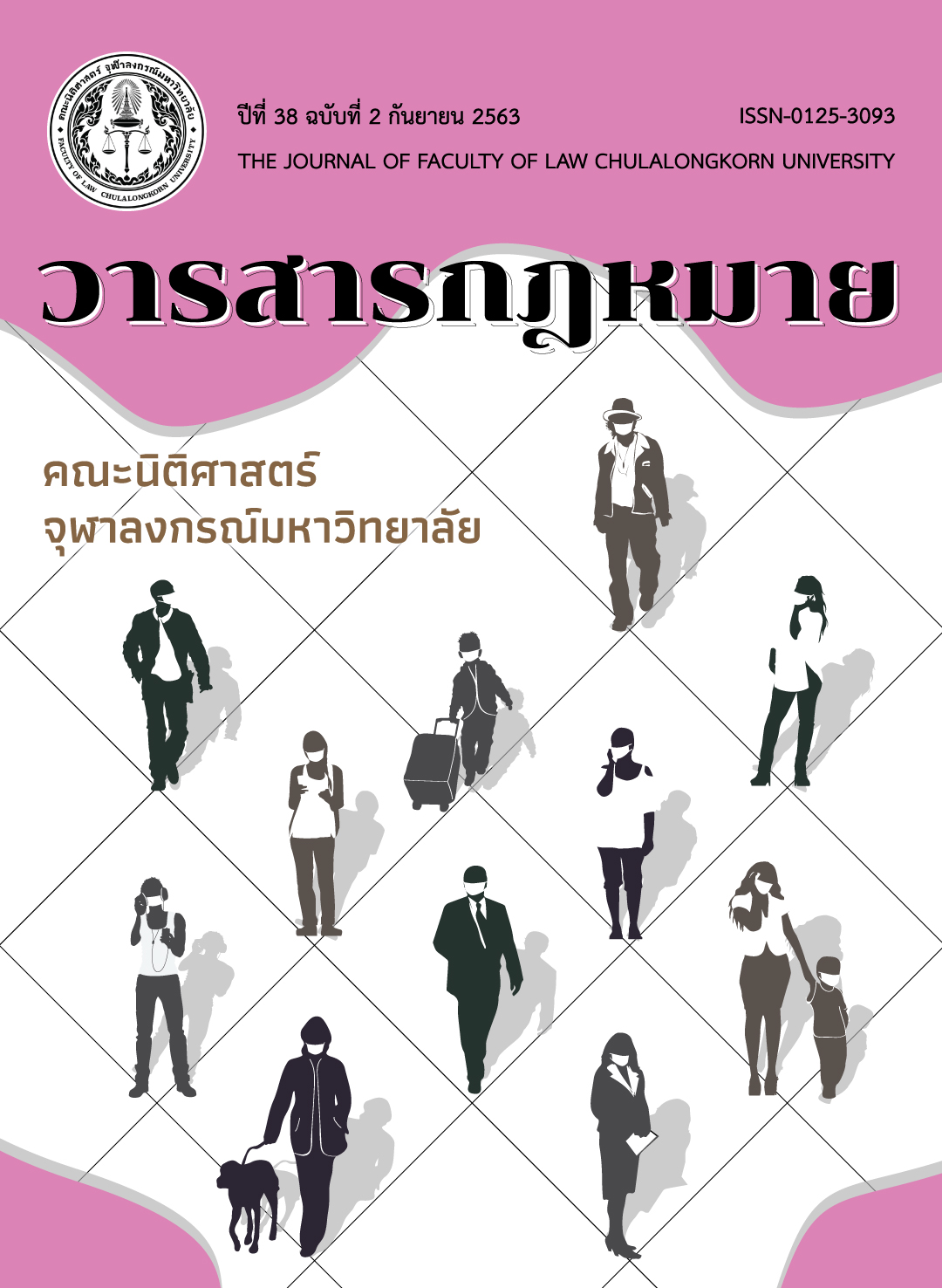รัฐที่เป็นต้นเหตุของการแพร่ระบาดใหญ่ของไวรัส Covid-19 มีความรับผิดหรือไม่ตามกฎหมายระหว่างประเทศ
Main Article Content
บทคัดย่อ
การแพร่ระบาดใหญ่ของไวรัส COVID-19 ที่ส่งผลกระทบต่อรัฐและปัจเจกชนทั้งในทางสังคมและเศรษฐกิจ ทำให้เกิดการเรียกร้องให้รัฐที่เป็นต้นเหตุของการแพร่ระบาดใหญ่รับผิดชอบความเสียหายที่เกิดขึ้น การจะพิจารณาว่ารัฐมีความรับผิดหรือไม่ตามกฎหมายระหว่างประเทศจำต้องพิจารณากฎเกณฑ์ปฐมภูมิซึ่งปรากฏอยู่ใน IHRs 2005 และธรรมนูญองค์การอนามัยโลก ที่กำหนดหน้าที่แก่รัฐสมาชิกในการแจ้งข้อมูลการระบาดของโรคต่อองค์การอนามัยโลกภายในกำหนดระยะเวลา การละเว้นไม่ปฏิบัติตามพันธกรณีดังกล่าวถือเป็นการกระทำผิดระหว่างประเทศซึ่งก่อให้เกิดความรับผิดแก่รัฐ แต่การเรียกค่าเสียหายจากการกระทำดังกล่าวมีความเป็นไปได้ยากเนื่องจากความท้าทายในการพิสูจน์ความสัมพันธ์ระหว่างการฝ่าฝืนพันธกรณีกับความเสียหายที่เกิดขึ้น ส่วนการดำเนินคดีกับรัฐต่างประเทศภายใต้ศาลภายในโดยปัจเจกชนนั้น มีความเป็นไปได้ในการชนะคดีค่อนข้างยากเพราะรัฐต่างประเทศมีความคุ้มกันจากการดำเนินคดีและบังคับคดี แม้จะปรากฏว่าในสหรัฐอเมริกา จะมีกฎหมายภายในที่ยกเว้นความคุ้มกันของรัฐต่างประเทศ แต่แนวปฏิบัติของศาลภายในของสหรัฐอเมริกาตีความจุดเกาะเกี่ยวทางดินแดนอย่างแคบ และยังไม่มีแนวทางที่ชัดเจนว่าศาลจะปรับใช้จุดเกาะเกี่ยวทางดินแดนเพื่อประโยชน์ของปัจเจกชนผู้เสียหาย หรือรัฐซึ่งเป็นจำเลย
Article Details
ลิขสิทธิ์และเนื้อหาในเว็บไซต์ของวารสารกฎหมาย (รวมถึง โดยไม่จำกัดเฉพาะ เนื้อหา รหัสคอมพิวเตอร์ งานศิลป์ ภาพถ่าย รูปภาพ ดนตรีกรรม โสตทัศนวัสดุ) เป็นกรรมสิทธิ์ของวารสารกฎหมาย และผู้ได้รับการโอนสิทธิทุกราย
1. วารสารกฎหมาย ให้อนุญาตให้คุณใช้สิทธิอันไม่เฉพาะเจาะจงที่สามารถถูกถอนเมื่อใดก็ได้ โดยไม่มีค่าใช้จ่าย ในการ
- เยี่ยมชมเว็บไซต์และเอกสารในเว็บไซต์นี้ จากคอมพิวเตอร์หรือเครื่องมือสื่อสารผ่านเว็บบราวเซอร์
- คัดลอกและจัดเก็บเว็บไซต์และเอกสารในเว็บไซต์นี้บนลงคอมพิวเตอร์ของคุณผ่านระบบความจำ cache
- สั่งพิมพ์เอกสารจากเว็บไซต์นี้สำหรับการใช้ส่วนตัวของคุณ
- ผลงานที่ได้รับการตีพิมพ์โดยวารสารกฎหมาย จุฬาลงกรณ์มหาวิทยาลัย ถูกคุ้มครองภายใต้ Creative Commons Attribution 4.0 International License ซึ่งอนุญาตให้ทุกคนสามารถคัดลอก แจกจ่าย ดัดแปลง ส่งต่อ ผลงานได้ ก็ต่อเมื่อผลงานและแหล่งข้อมูลได้รับการอ้างอิงอย่างเหมาะสม
2. วารสารกฎหมาย จุฬาลงกรณ์มหาวิทยาลัย สงวนสิทธิ์ไม่อนุญาตให้คุณใช้สิทธิอื่นใดที่เกี่ยวข้องกับเว็บไซต์และเอกสารบนเว็บไซต์นี้ เช่น การคัดลอก ดัดแปลง เปลี่ยนแปลง ส่งต่อ ตีพิมพ์ แจกจ่าย เผยแพร่ จัดแสดงในที่สาธารณะ ไม่ว่าจะในรูปแบบใดก็ตาม ซึ่งเว็บไซต์หรือเอกสารบนเว็บไซต์ โดยไม่อ้างอิงถึงแหล่งข้อมูลหรือโดยไม่ได้รับอนุญาตเป็นลายลักษณ์อักษรจากวารสารกฎหมาย จุฬาลงกรณ์มหาวิทยาลัย
3. คุณอาจขออนุญาตที่จะใช้เอกสารอันมีลิขสิทธิ์บนเว็บไซต์นี้โดยการเขียนอีเมลล์มายัง journal@law.chula.ac.th
4. วารสารกฎหมาย จุฬาลงกรณ์มหาวิทยาลัย เข้มงวดกับการคุ้มครองลิขสิทธิ์อย่างมาก หากวารสารกฎหมาย จุฬาลงกรณ์มหาวิทยาลัยพบว่าคุณได้ใช้เอกสารอันมีลิขสิทธิ์บนเว็บไซต์นี้โดยไม่ถูกต้องตามการอนุญาตให้ใช้สิทธิ ดังที่กล่าวไปข้างต้น วารสารกฎหมาย จุฬาลงกรณ์มหาวิทยาลัยอาจดำเนินคดีตามกฎหมายต่อคุณได้ เพื่อเรียกร้องค่าเสียหายที่เป็นตัวเงินและคำขอชั่วคราวให้คุณหยุดการใช้เอกสารดังกล่าว ทั้งนี้ คุณอาจถูกสั่งให้ชดใช้ค่าใช้จ่ายใดๆ ที่เกี่ยวข้องกับการดำเนินการตามกฎหมายนี้
หากคุณพบเห็นการใช้เอกสารอันมีลิขสิทธิ์ของวารสารกฎหมาย จุฬาลงกรณ์มหาวิทยาลัย ที่ขัดหรืออาจขัดต่อการอนุญาตให้ใช้สิทธิดังที่ได้กล่าวไปข้างต้น โดยเชื่อว่าได้ละเมิดลิขสิทธิ์ของคุณหรือของผู้อื่น สามารถร้องเรียนมาได้ที่ journal@law.chula.ac.th
เอกสารอ้างอิง
“China Rejects Report that It Delayed COVID-19 Information Sharing with WHO.” Reuter, 3 June 2020. https://www.reuters.com/article/us-health-coronavirus-china-who/china-rejects-report-that-it-delayed-covid-19-information-sharing-with-who-idUSKBN23A0YM. Retrieved on 2 July 2020.
Antonio Coco & Talita de Souza Dias. “Part I : Due Diligence and COVID-19: States’ Duties to Prevent and Halt the Coronavirus Outbreak” EJIL:Talk!, 24 March 2020 https://www.ejiltalk.org/part-i-due-diligence-and-covid-19-states-duties-to-prevent-and-halt-the-coronavirus-outbreak/ Retrieved on 3 July 2020.
Armin Von Bogdandy & Pedro A. Villarreal. “International Law on Pandemic Response: A First Stocktaking in Light of the Coronavirus Crisis” MPIL Research Paper Series (2020-07): 6 – 7.
Asher Stockler. “At Least Four Class-Action Suits Filed Against China, Seeking Trillions Over Coronavirus Outbreak in U.S.” Newsweek, 16 April 2020. https://www.newsweek.com/china-class-action-lawsuits-covid-19-1498400. Retrieved on 5 July 2020
David P. Stewart. “The Foreign Sovereign Immunities Act: A Guide for Judges.” Federal Judicial Center 2013 https://www.fjc.gov/sites/default/files/2014/FSIAGuide2013.pdf Retrieved on 5 July 2020.
Derrick Bryson Taylor. “How the Coronavirus Pandemic Unfolded: A Timeline.” The New York Times, 9 June 2020. https://www.nytimes.com/article/coronavirus-timeline.html. Retrieved on 30 June 2020.
Evaluating the Initial Impact of COVID-19 Containment Measures on Economic Activity.” OECD. https://www.oecd.org/coronavirus/policy-responses/evaluating-the-initial-impact-of-covid-19-containment-measures-on-economic-activity-b1f6b68b. Retrieved on 30 June 2020.
H.L.A. Hart & Tony Honoré. Causation in the Law 2nd edition (Oxford: Clarendon Press, 1985), 109 – 129
James Crawford. “Internationally Wrongful Acts.” in Max Planck Encyclopaedias of International Law II (Oxford: Oxford University Press, 1995), 1398 – 1403
James Crawford. State Responsibility: The General Part (Cambridge: Cambridge University Press, 2013), 219 – 232.
Jankiewicz, Castellanos León. “Causation and International State Responsibility.” 15 January 2012 http://www.sharesproject.nl/wp-content/uploads/2012/01/Castellanos-Causation-and-International-State-Responsibility1.pdf. Retrieved on 30 June 2020
John B. Bellinger. “Suing China Over the Coronavirus won’t Help. Here’s What Can Work” The Washington Post, 23 April 2020. https://www.washingtonpost.com/opinions/2020/04/23/suing-china-over-coronavirus-wont-help-heres-what-can-work/. Retrieved on 30 June 2020
Nectar Gan et al. “Beijing Tightens Grip Over Coronavirus Research, Amid US-China Row on Virus Origin.” CNN, 16 April 2020. https://edition.cnn.com/2020/04/12/asia/china-coronavirus-research-restrictions-intl-hnk/index.html. Retrieved on 2 July 2020
Niels Blokker. “Is the Authorization Authorized? Powers and Practice of the UN Security Council to Authorize the Use of Force by ‘Coalitions of the Able and Willing’.” European Journal of International Law 11 (2000): 541 – 568.
Sompong Sucharitkul. “Immunities of Foreign States Before National Authorities” Recueil des Cours 149 (1976): 87.
Stephen L. Carter. “No. China Can’t be Sued Over Coronavirus” Bloomberg Opinion, 25 March 2020. https://www.bloomberg.com/opinion/articles/2020-03-24/can-china-be-sued-over-the-coronavirus. Retrieved on 5 July 2020
Symeon C. Symeonides. “Choice of Law in Cross-Border Torts: Why Plaintiffs Win and Should” Hastings Law Journal 61 (2009): 337 – 411
Timo Kolvurova. “Due Diligence” Max Planck Encyclopedias of International Law. February 2010. https://opil.ouplaw.com/view/10.1093/law:epil/9780199231690/law-9780199231690-e1034. Retrieved on 3 July 2020
Xiaodon Yang. State Immunity in International Law (Cambridge: Cambridge University Press, 2012), pp 34 – 37


